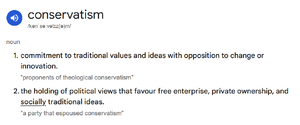-
Posts
8,341 -
Joined
-
Last visited
-
Days Won
70
Content Type
Profiles
Forums
Gallery
Downloads
Blogs
Events
Our Shop
Movies
Everything posted by Jerry_Atrick
-
Making reservations
-

Content and Providers Worth Sharing(Not Political)
Jerry_Atrick replied to Jerry_Atrick's topic in General Discussion
Here is another from the fella above. His camera skills are getting much better, and the drone footage is amazing. I thinkt he drone shot chasing the kangaroos is stock footage, personally.. He also probably is using AI to generate the music, too.. Or maybe he has some ardent followers. Although I am no s fan of the country genre ingeneral, I really enjoyed this one, albeit a bit of a schmulzy start: And, although I know road trains and trucking in Aus, in general isn't all nice and easy and there are some shippy times, if I had fo seen these vids when I was younger, I may well have taken a totally difference occupational path. -
She is sort of well known in statistical circles (pardon the pun)
-
It's better than the alternative..
-
thanks, @onetrack - I couldn't remember if he owned it or not, but when I was getting my UK PPL at Elstree, he was still flying and quite a legend - although I never met the man. It was the shittiest aiirfield I had ever flown from by a long mile, and that includes a couple of gravel strips in Vic (Melton and Coldstream).. The CAA closed it as the runway (bitumen) had potholes big enough to rattle a road train. At the eatern end of the runway, there was a row of, as I recall, pine trees, that got the heart racing a bit when taking off, especially when it was hot. And, because I already had an Aussie PPL, I went for the cheapest school on C150s that were so tired, there were days that we decided not to go as the margin for error over those trees was not great. I binned that school in the end and went for a field closer to home. More expensive per hour, but done a lot quicker.
-
A Juicy Burger? Ol' Flo Nigthingale, I guess?
-
I can't remember the name of the fella, but apparently he owned Elstree airport north of London and he was able to fly solo until well into his 90s.. I think about 94... He had to have a medical either quarterly or monthly, which included the ECG. Eventually he had to have a safety pilot with him, but he could still be the commander. He eventually had to hang up his headsets and I think died not too long after. Bob Hoover was still going strong at 77 doing his aerobatic routine in the Commander, I think it was. He was still OK flying, but apparently couldn't get insurance for his airshows.
-
Yes, I understand that... These are more designed to test how you act under pressure... The problem is I read the lowest and immediately thought imposiible.. Double checked the question text, figured they meant above, but, hey, it's fun to find the real answer to the question.
-

Let's talk about Artificial Intelligence
Jerry_Atrick replied to old man emu's topic in Science and Technology
A bit of an "Aussie" development: Lets hope, evne though Anduril is the manufacturer, Aussie business aslo get some of the cake. -
Hmmm.. There is no answer as it is infininte. For example, negative ten is lowe number after one that begins with the last letter of the number preceding it (on the number scale). And they keep going lower than that for negative infinite. If they wanted te next positive number after one, then they should have said that, or at least said "the lowest number above one..." Nice trick question.
-
They're campsites for a weekend escape
-
-
Getting back to your point @pmccarthy, it isn't communism that is the issue for Australia; it is the structure of the economy and dumb policy decisions made by both governments and large corporations. I think this is an interesting video of Jack Ma, who founded Alibaba. Its where the economy invests. Australia, like America makes poor choices when it comes to investments, driven by shorter term greed rather than longer term returns.. It isn't a race to the bottom. Yeah, cheap labour and other inputs makes you competitive, but Chinese average earnigns are starting to increase: That latest numbers equates to about $17k USD, which is still low, but look at the trajectory. And like Japan, as the economy really matures (it is considered emerging still)), its currency will appreciate and it will lose its competitive edge. But what has China beein doing? Investing in developing new technology in many secotrs, including engineering and tooling to automate manufacture and make it cheaper to deliver with increasing labour costs. What did Australia and the USA do with their massive profits? You can have a well functioning economy with decent wages for employees to maintain a connected, healthy and motivated workforce, who may bring some ingenuity to the table, too. China isn't perfect by any stretch and they have advantages of a central (communist, I believe) power regime to not totally vested interests get the better of its objectives.
-
Huh? How do yo even get the left side of the brain being conservative. The very definition of conservatism is, and I am quoting Mr. Google: Look at the first definition and even the second definition ties into the first.. "Oppostion to change or innovation" The left side of the brain: So, the left side of the brain is about language, logic, and analytical thinking.. Reasoning, and mathemoatical capability. These are facets of pregressiveness and innovation. I work in a mathemagical field, and it is largely innovative. That is not to say all progression and innovation is correct, either.. that is not what I am talking about.. But clearly, either your definition of politically right isn't the same as what most people think it is, or, to be quite honest, I have no idea how you justify most of your assertions. On reflection, I don't really care.. you're entitled to your opinion based on your view of the facts. Heck, your view may be more valid than mine. But so far, you haven't proffered any facts to support your stance. We are all open eyes and ears.. Have a shot at it. Google is your friend (or until you provide facts, foe, at the moment.)
-
They may as well.
-
Don't buy it... simples..
-
Ya live by the sword...ya die by the novachok
-
According to my mum, I never had chicken pox, mumps, etc as a kids and I certainly didn't have it as a teenager or adult. But, when I last lived in Aus, I got shingles across my bac. It lasted about 2 weeks. Had no idea what it was. The doc said I could have been exposed to it as a kid and never shown symptoms. Touch wood, never had it again, and I certainly will not miss them.
-

The climate change debate continues.
Jerry_Atrick replied to Phil Perry's topic in Science and Technology
When do we grow out of crying for a boob, exactly? -
Banks and economists get predictions wrong all the time..
-
The cash rate is 3.85%; hardly bank breaking if everyone listened to advice and didn't max out during the extended period of low interest rates. It is the ling term normal rate
-
Don't have to go insulting whores and hookers...
-
Thge Crimes Act 1958 (Vic) doesn't actually define the crime of murder, so it must be the common law definition, of which the mens rea (guilty mind, in modern times, the fault element) is intention to kill, intention to commit grievous bodily harm, or with reckless indifference to human life. Reckless indifference to human life is subjective (i.e. what was in the mind of the defendant, and not what a reasonable or normal person would think). And basically it means that she knew that her actions were likely/probably going to kill, she knew they were likely to kill, but she went ahead with her actions without necessarily the desire to kill them. I am no lawyer, let alone a prosecutor, but my guess is the prosecution provied beyond reasonable doubt to the jury that a) She had formed the intent either by the time she served the food, or by allowing it to continue to be eaten, during them eating the food (although that could be an interesting ground for appeal); or that she knew the mushrooms were death cap mushrooms and that she intended to serve the mushrooms to those members of the family she killed/attempted to kill, knowing they were likely to cause death, even though, say, she only wanted it to be the most delicious beef wellington they ever tasted. The jury, after examining the evidence would have to form the conclusion beyond reasonable doubt, that either of the two fault elements existed. I read there was an assertion she served herself and others of her family at the dinner a differently made beef wellington, and if that was true, that may well be some of the evindence that she intended to kill or was at least reckless to their lives. Also, remember, that any od the defences that she has available to her, only have to be proved on the balance of probabilities. In some of the NSW criminal cases we looked at, there were very lengthy directions to the jury, augmented with writeen directions. This may work in the defence's favour, because in such a long summation/direction, can result is some mistakes creeping in. If they are big enough, a mistrial will be delcared and the thing has to happen all over again. The facts of this case, from what I have read, would make it a complex case to prove, more than weakness of evidence per se. There appears to be little doubt of the act itself; the problem would be proving the requisite mens rea/guilty mind/fault element because of the subjective nature that is defined for murder.
-
In fact, I will ge priority boarding as they want me out of the UK ASAP wearing that stuff.
-
I wasn't referring to Joe. In fact, I hadn't been to the US during Joe's administration.. The US immigration has always had a bad reputation and have many times turned people back over the years for minor concerns, sometimes political. If you were white South African before the dismantling of apartheid, it was a lottery whether you would get in or not (that wasn't limited to the USA, though, in fairness).










